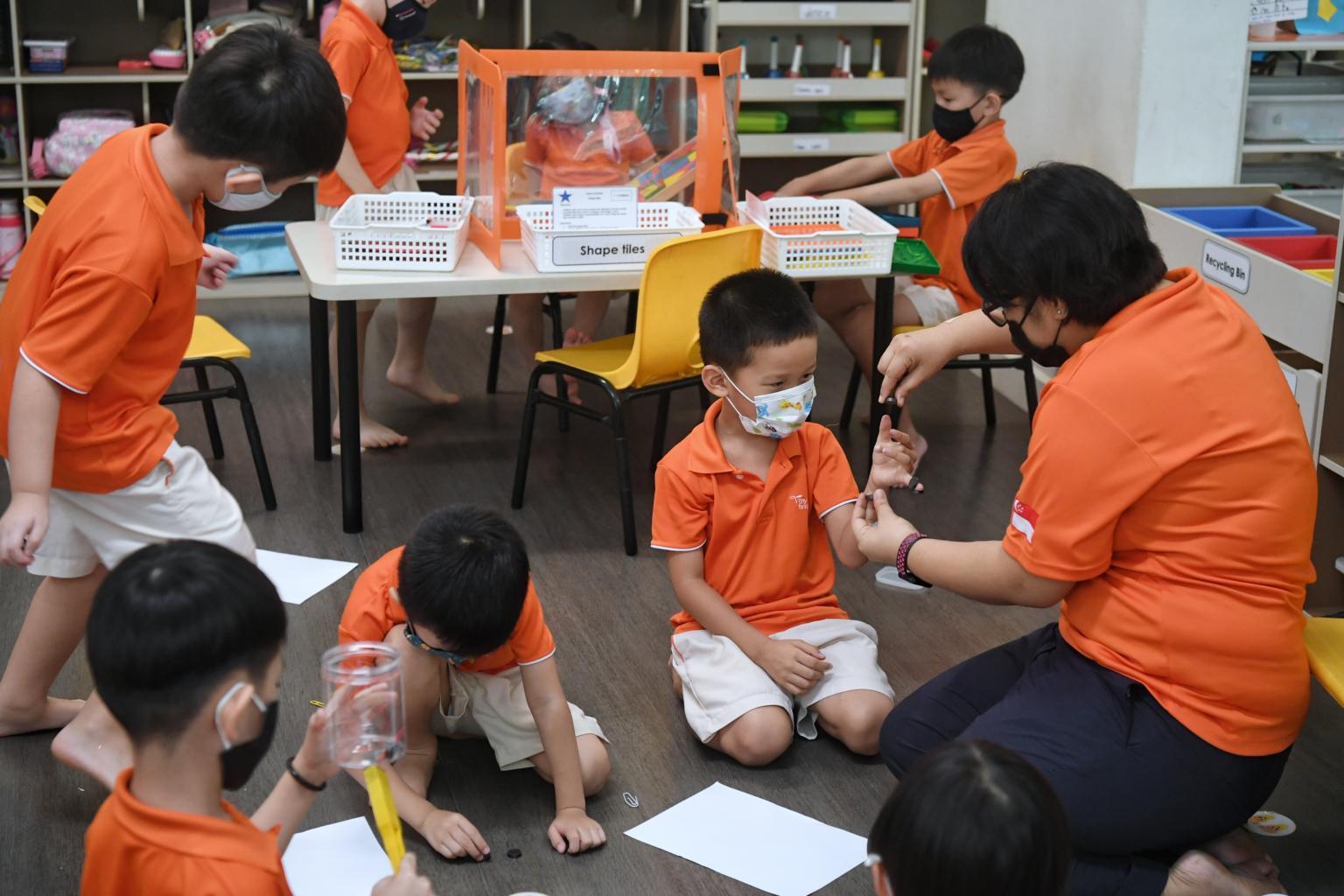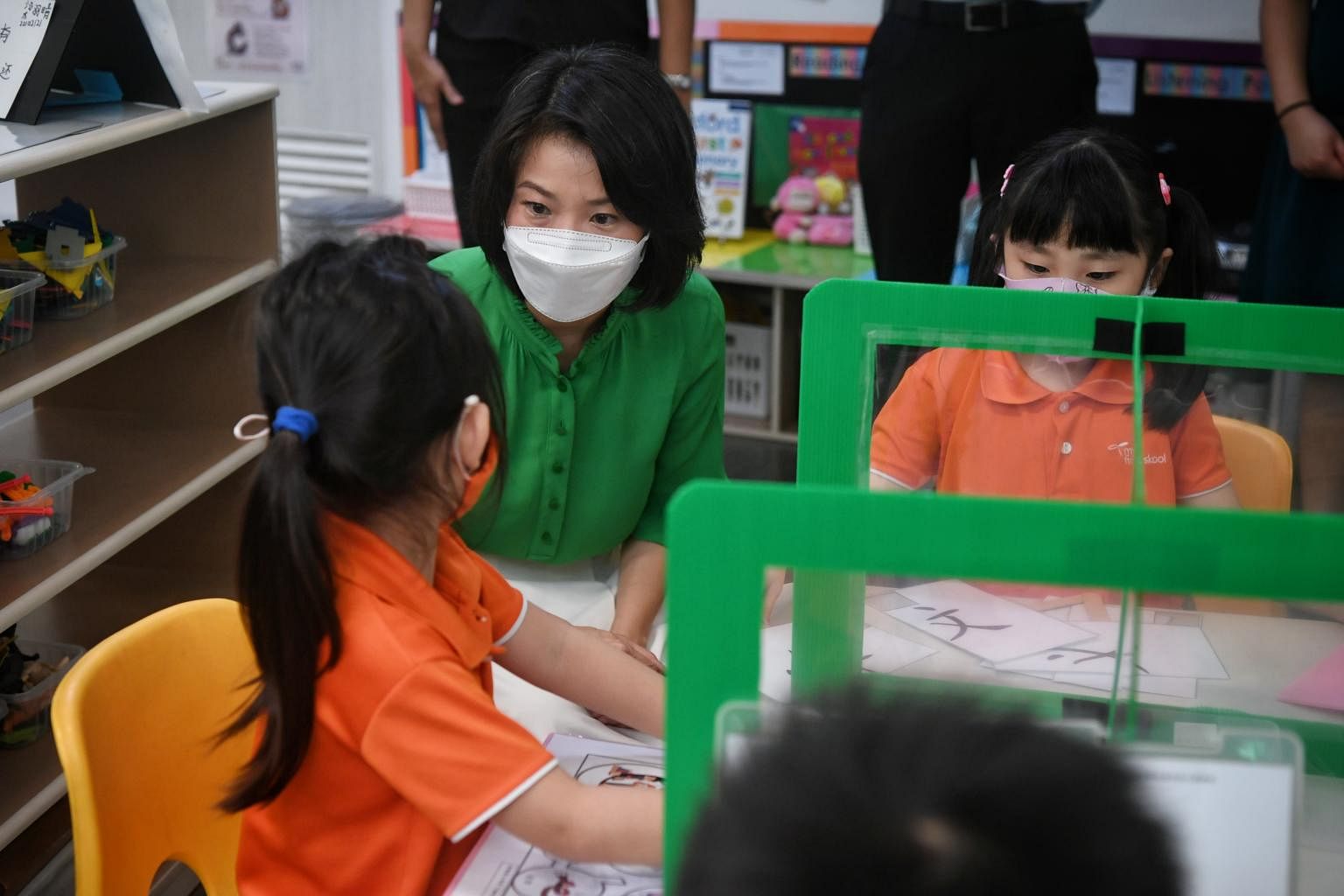More targeted support for pre-schoolers with developmental needs in S'pore in coming years
Sign up now: Get tips on how to help your child succeed

Inclusion coordinators will be appointed at the more than 1,900 pre-schools.
ST PHOTO: KUA CHEE SIONG
SINGAPORE - The families of pre-schoolers with developmental needs can look forward to more professional and targeted support within the schools in the coming years.
Inclusion coordinators will be appointed at the more than 1,900 pre-schools here and there will be a roll-out of more inclusive education training opportunities for teachers.
Existing support programmes will also be offered at more pre-schools or integrated with pre-schools to reduce shuttling between centres.
These moves by the Early Childhood Development Agency (ECDA) are in response to seven recommendations announced by the inclusive pre-school work group on Friday (April 30).
The work group consulted about 60 participants in two focus group discussions and also received feedback from 900 parents in an online survey.
It also unveiled a new four-tier framework on Friday that aims to enhance support for children with developmental needs as well as signal that all pre-schools have a part to play in this endeavour.
The framework splits early intervention support into four tiers - from low to high levels of support.
The first tier is universal or general support, to be offered at all pre-schools, followed by programme-based support, which includes the existing Development Support-Learning Support programme and will be available at a majority of pre-schools.
The third tier is inclusive support and will be available at some pre-schools, while the last tier involves specialised support for those who require the highest level of early intervention at external centres, such as through the Early Intervention Programme for Infants and Children.
Several initiatives by the Ministry of Social and Family Development (MSF) were announced during its budget debate in March and address the recommendations of the work group.
Among them are the Inclusive Support Programme pilot, which will integrate services provided by intervention centres and pre-schools, thereby reducing the logistical strain of shuttling between venues, and the Certificate in Inclusive Practice for early childhood educators to learn strategies to support children with developmental needs.
The work group is co-chaired by Ms Sun Xueling, Minister of State for Social and Family Development and Education, and Associate Professor Kenneth Poon, National Institute of Education associate dean of education research.
Ms Sun said on Friday that the pilot is meant to provide greater convenience for parents and pre-schoolers with medium-support needs.
"We'll be launching seven of these pilots starting at the end of the year, and progressively in 2022," she added.
The first pilot is to be rolled out by the end of this year.

Minister of State for Social and Family Development and Education Sun Xueling's visit to NTUC First Campus' My First Skool at Blk 238 Kim Keat Link.
ST PHOTO: KUA CHEE SIONG
Ms Sun was speaking to the media after a visit to NTUC First Campus' My First Skool at Block 248 Kim Keat Link.
She noted that the new 120-hour certification course is meant to teach early childhood educators pedagogies that can benefit both children with developmental needs and typically-developing children in the classroom.
The course, which will be rolled out in June this year, can be completed within six to eight months.
Those taking it will learn how to understand learning differences in children and how to create a suitable learning environment for inclusive practice. The course will also teach skill sets in differentiated learning, and classroom and behaviour management.
Polytechnic adjunct professor Jason Goh, whose four-year-old son Jake has speech delay, welcomed the new certification.
"It would be more assuring for parents because we'll know that the teachers are trained and able to really help my son improve," said Mr Goh, 53.
Prof Poon said that the work group received feedback about the inconvenience of having to shuttle between centres. Some pre-schools also said their teachers may not be ready to support children with developmental needs.
Another concern is the potentially negative reactions from typically-developing children when they realise a child with developmental needs is in the same class, he said.
Other recommendations put forth by the work group include enhancing integration opportunities for children requiring high levels of early intervention support, enabling more timely and systematic identification of developmental needs and strengthening parental support through parent education.
In response, MSF and ECDA said they will work with early intervention centres and pre-schools to explore opportunities for purposeful interactions between children who need high levels of early intervention and their peers.
Together with the Education Ministry, they released a set of professional practice guidelines in February 2021 to consolidate information on early intervention programmes and practice guidelines, as well as standardise and streamline assessments and referrals.
Various measures
For children
• Inclusion coordinators - who will be trained - will be appointed from the second half of 2023.
• The Development Support-Learning Support programme will be expanded to more pre-schools and cover 60 per cent of pre-schoolers by 2025 and 80 per cent eventually. To support the expansion, more learning support educators will be trained.
• Selected pre-schools will be involved in the Inclusive Support Programme pilot.
• The Ministry of Social and Family Development (MSF) and the Early Childhood Development Agency (ECDA) will work with early intervention centres and pre-schools to explore opportunities for purposeful interactions between children who require high levels of early intervention support and their peers.
For teachers
• MSF, ECDA and the National Institute of Early Childhood Development will enhance the inclusive education component in existing early childhood pre-service training and continuing professional development.
• A Continuing Professional Development road map is in the works for early childhood educators, with "inclusive practice" as a focal area.
• New programmes and courses will help educators acquire inclusive strategies.
For parents
• Professional practice guidelines were released in February consolidating information on early intervention programmes, to standardise and streamline assessments and referrals.
• Additional resources for parents and caregivers will be curated and uploaded on the Enabling Guide website.


